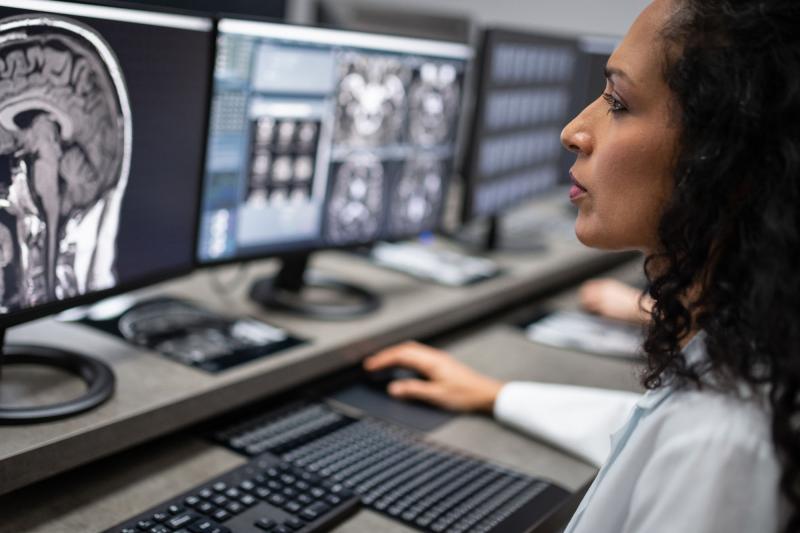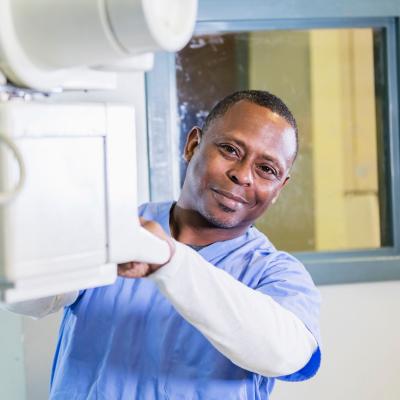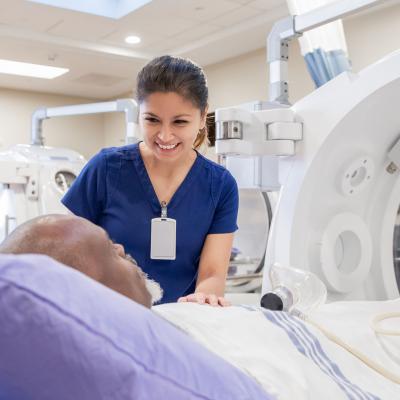- AdventHealth University

Radiology imaging (often referred to as diagnostic imaging) is an established but still growing field in modern health care which uses imaging techniques such as X-rays, magnetic resonance imaging (MRI), computed tomography (CT), and ultrasounds to diagnose and treat medical conditions. Whether you are interested in healthcare, technology, or helping patients, there are many opportunities for specialization. Here, we delve into six diagnostic imaging careers, highlighting their roles, responsibilities, and prospects.
Radiologic Technologist
Radiologic technologists, (less commonly referred to as diagnostic radiographers) are responsible for producing high-quality images of patients' internal structures to diagnose any issues or medical conditions. These scans can reveal anything like broken bones, tumors, or foreign objects, so they play a pivotal role in hospitals and urgent care centers. They operate X-ray machines, CT scanners, and other imaging equipment to capture these images that help with the patient’s diagnosis. Radiographers work closely with radiologists and other healthcare professionals to ensure accurate diagnoses and effective treatment plans. Radiologic technologist may specialize in areas such as mammography, bone densitometry, or interventional radiography.
MRI Technologist
MRI technologists are specialists in operating magnetic resonance imaging (MRI) scanners. The MRI scanner can produce detailed images of soft tissues and organs. MRI technologists make sure that patients are positioned correctly and provide clear instructions to minimize movement of the patient during the scan and achieve the best quality scan. MRI technologists work closely with radiologists to capture images that help diagnose conditions such as tumors, injuries, and neurological disorders. With the growing demand for MRI scans in healthcare, skilled MRI technologists are in high demand, offering promising career prospects.
CT Technologist
CT technologists, also known as computed tomography technologists, specialize in operating CT scanners to create detailed cross-sectional images of the body. They prepare patients for scans, administer contrast agents, and ensure that the equipment is functioning properly. CT technologists collaborate with radiologists to interpret images and assist in diagnosing conditions such as cancers, cardiovascular diseases, and trauma injuries. With the increasing prevalence of CT scans in medical diagnostics, CT technologists are able to deliver more clear and accurate scans to help patients.
PET Specialist
PET (Positron Emission Technology) specialists work closely with radiation oncologists and are primarily responsible for delivering radiation treatments to cancer patients. They operate specialized radiology equipment to administer prescribed doses of radiation therapy while having to ensure patient safety and comfort. Radiation therapists play a crucial role in administering prescribed treatment, documenting the progress throughout treatment, and providing compassionate care and support. With their technical expertise and care for their patients, PET specialists and radiation therapists play a meaningful role in the treatment of cancer patients.
Nuclear Medicine Technologist
Nuclear medicine technologists specialize in diagnosing and treating diseases at the molecular level using radioactive tracers. They administer radiopharmaceuticals (drugs that contain radioactive isotopes) to patients and utilize imaging techniques such as PET scans and SPECT scans to analyze organ function and detect any abnormalities. Nuclear medicine is an essential part of modern healthcare because it offers a unique perspective into disease processes that may not be captured by other imaging modalities. With advancements in radiopharmaceutical development and personalized medicine, nuclear medicine physicians have the opportunity to work with the latest technology and strategies.
Sonographer
Sonographers, also known as ultrasound technologists, specialize in using sound waves to create images of the body's internal structures. They perform a variety of ultrasound examinations, including monitoring fetal development, abdominal, obstetric, cardiac and vascular scans, to help diagnose medical conditions. Sonographers play a crucial role in guiding interventions such as biopsies and injections and provide real-time imaging during surgical procedures. Sonography is super versatile and non-invasive, giving this career diverse opportunities in hospitals, clinics, and imaging centers.
Getting Started on Your Career in Radiography
Radiography has a large variety of careers no matter how specialized you want to be and it’s perfect for people who are passionate about technology, patient care, and diagnostic imaging. Whether specializing in diagnostic radiography, MRI, CT, radiation therapy, nuclear medicine, or ultrasound, each role plays an important part in helping patients with their specific needs. Technology is always growing and advancing, which allows careers in radiography to become more efficient and be a pivotal part of the health care community.
If you are ready to take the next step in a career in radiography or another related diagnostic imaging discipline, AdventHealth University offers an Associate of Science in Radiography program as well as our Bachelor of Science in Nuclear Medicine Technology program.
Recommended Readings
Benefits of Interventional Radiology
Nine Key Figures in Radiology
How to Become A Radiology Director
Sources
Radiologic and MRI Technologists." Bureau of Labor Statistics, U.S. Department of Labor


